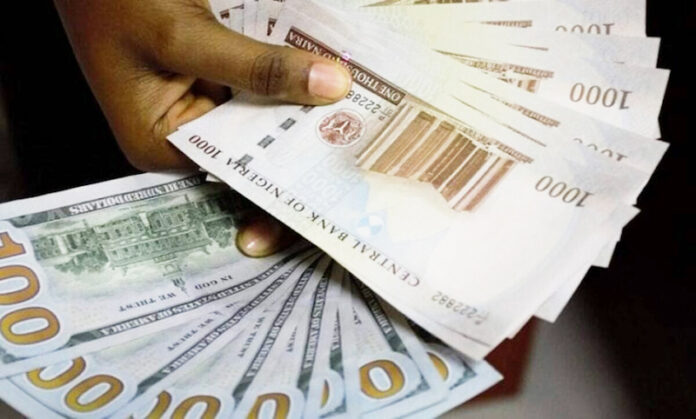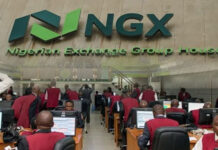Following the unification of foreign exchange (FX), by the Central Bank of Nigeria (CBN), the value of naira against the dollar has depreciated by 80.81 per cent Year-on-Year (YoY) to an average N797.43/dollar as of October 2023, THISDAY investigation has revealed.
The data sourced from the FMDQ Securities Exchange revealed that naira against the dollar was trading at N441.02/ dollar October 2022 at the Spot FX market.
A foreign exchange spot transaction, also known as FX spot, is an agreement between two parties to buy one currency against selling another currency at an agreed price for settlement on the spot date.
According to THISDAY investigation, the local currency moved to an average N625.9/ dollar in June 2023, the month President Bola Tinubu suspended subsidy on fuel and ordered the CBN to work towards a unified exchange rate.
The naira at the spot FX market of FMDQ Exchange cross the average price of N700/dollar in July amid scarcity and increasing speculation trading at the parallel market rate.
The financial market report of FMDQ Exchange showed that average naira reached N769.51/Dollar in July, representing a 80.21 per cent YoY and 122.94 per cent Month-on-Month (M-o-M) decline, respectively.
Between January and October 2022, the average price of naira/dollar was hovering around N/dollar amid CBN interventions in critical sectors such Aviation, manufacturing, among others.
The bold step by this present administration has created mixed reactions among industry stakeholders amid move by the government to allow the local currency to float and create room for market forces the price of the local currency.
The World Bank had described the naira and the kwanza of Angola as the “worst performing currencies” in Africa so far in 2023.
The World Bank in its Africa’s Pulse report — a bi-annual publication of the office of the chief economist in the World Bank Africa Region, said the decision of the CBN to remove trading restrictions on the official market weakened the naira.
The lender cautioned Ethiopia, Ghana, Nigeria and other countries with two-digit inflation rates to avoid unorthodox interventions that might render their monetary policies ineffective.
The interventions the World Bank warned against are: “…monetarization of the fiscal deficit, direct lending interventions, untargeted subsidy programs, or foreign exchange controls”.
“If monetary and fiscal actions are not adequately coordinated to bring down inflation, the risk of de-anchoring inflation expectations would fuel further inflation, accelerate interest rate increases, and exacerbate the deceleration of economic activity,” the report said.
Speaking with THISDAY, the Vice President, Highcap Securities Limited, Mr. David Adnori said heavily relies on oil exports as a major source of revenue has played a major challenge facing foreign exchange market in Nigeria.
According to him, “the fluctuations in global oil prices can significantly impact the country’s foreign exchange earnings. When oil prices drop, Nigeria’s foreign exchange reserves are affected, leading to challenges in meeting its external obligations and having enough foreign exchange liquidity.”
He noted speculation in the foreign exchange market and activities in the parallel market exacerbated volatility when the government announced the unification exercise.
“This led to distortions in the exchange rate and hinder the Central Bank’s ability to implement effective monetary policies,” he said.
He added further that Nigeria often experiences trade imbalances, with higher imports compared to exports, stressing that this often leads to increased demand for foreign exchange to pay for imports, putting pressure on the country’s foreign reserves.
The CBN governor, Mr Olayemi Cardoso, at the recent Chartered Institute of Bankers of Nigeria (CIBN) 58th Annual Bankers’ Dinner and Grand Finale of the Institute’s 60th Anniversary in Lagos, disclosed to banking sector executives that the apex bank is responding to foreign exchange scarcity in the market with payments made to 31 banks to clear the backlog of foreign exchange forward obligations.
“We have been subjecting these payments to detailed verification to ensure only valid transactions are honoured. In a properly functioning market, it is reasonable to expect significant foreign exchange liquidity, with daily trade potentially exceeding $1.0 billion. We envision that, with discipline and focused commitment, foreign exchange reserves can be rebuilt to comparable levels with similar economies, “he said.
He assured Nigerians that the apex bank monetary policies would aim to achieve price stability, foster sustainable economic growth, stabilize the exchange rate of the naira, and reduce interest rates to facilitate borrowing and investments in the real sector.
“In order to ensure the proper functioning of domestic and foreign currency markets, clear, transparent, and harmonized rules governing market operations are essential. New foreign exchange guidelines and legislation will be developed, and extensive consultations will be conducted with banks and foreign exchange market operators before implementing any new requirements,” the CBN governor said.
Speaking on the move to strengthen the naira at the foreign exchange market, the CEO, Wyoming Capital and Partners, Mr. Tajudeen Olayinka urged the CBN to create numerous sources of attracting foreign exchange inflow and improved on domestic production.
According to him, “the CBN has to create multiple avenues for supply of foreign currencies, such as US dollar, and improve domestic production of Goods and Services in a manner that promotes healthy competition.
“To create supply means that CBN must continually work out the best market structure that eliminates or reduce exchange rate divergence. Absence of exchange rate convergence is the reason for illiquidity in the official foreign exchange market. So, there is no other formula.”



















